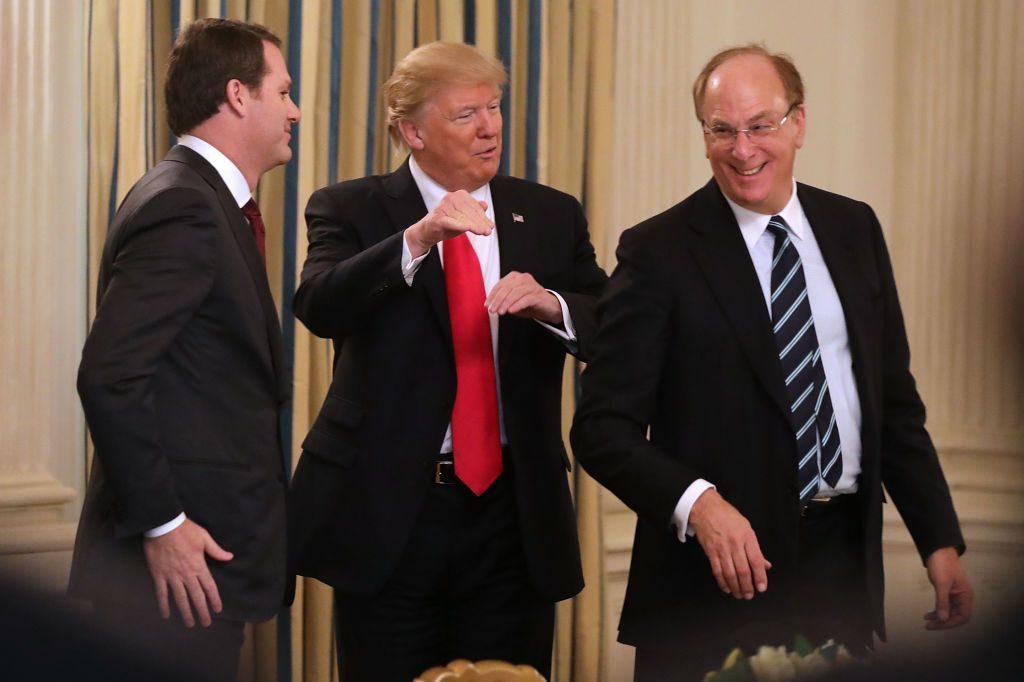
Will Larry Fink’s prod to CEOs change the way performance is viewed by institutional investors or simply politicize an issue that has persisted for generations?
BlackRock CEO Larry Fink recently sent a letter to the chief executives of the world’s largest public companies, calling for them to help improve society or risk losing support from BlackRock, which just surpassed $6 trillion in total assets under management in the latest quarter.
“I have had conversations pretty close to half the CEOs who received the letter, and I don’t believe they’re sucking up to me,” Fink told “Squawk Box” in an interview at the World Economic Forum in Davos, Switzerland. “They were very favorable.”
Not all the CEOs received Fink’s comments well. Billionaire investor Sam Zell told CNBC last week that Fink and other CEOs are “extraordinarily hypocritical” to push companies for more social responsibility. “I didn’t know Larry Fink had been made God,” Zell said. Why should a passive fund do anything other than insist on financial performance? Will funds like BlackRock start contesting the seats of board directors who don’t support the fund’s policies?
“Our investors have asked us about pushing managers to be more active, to be more engaged.”
A number of business leaders referenced Milton Friedman’s famous essay about the social responsibility of business when he wrote that the chief responsibility of business is to make a profit, nothing more. Politicians and the public are better positioned to decide where to spend their earned dividends. Otherwise business places itself in the unenviable position of picking some causes over others to support with money that doesn’t belong to management. It’s an invitation for the politicization of a company’s investment policies.
There is no conflict with what Milton Friedman wrote 35 years ago, Fink told NBC’s Squawk Box. ”Friedman said at the time that companies need to be connected to their communities, to have a long-term purpose. Our investors have asked us about pushing managers to be more active, to be more engaged. Being engaged during proxy season is not being truly engaged. We argue that being engaged with shareholders for the long-term will make for a more profitable company.”
There is an inherent conflict with a management fund such as BlackRock when it comes to corporate stewardship. Will BlackRock penalize a company that doesn’t play ball with Larry Fink or his investment team’s position even though it may otherwise perform well with respect to returns to shareholders? What about companies that produce more hydrocarbons than is politically correct, or companies like Coca-Cola that sell sugary drinks? This is one of the reasons why Hank Greenberg, when he ran AIG in the 1990s, solicited shareholders directly what social causes they wished the company to support.
It is a topic that promises to persist. The thinking about business’s involvement is continually in flux. “There is a new breed of constituents that businesses are ignoring and treating haphazardly. And they do so at their own peril,” writes Mark Kennedy, president of the University of North Dakota and former treasurer of Macy’s, in a recently published book, “Shapeholders, Business Success in the Age of Activism.” Such people argues Kennedy demand a different engagement approach than those benefiting from a company’s success.”
Chief Executive Group exists to improve the performance of U.S. CEOs, senior executives and public-company directors, helping you grow your companies, build your communities and strengthen society. Learn more at chiefexecutivegroup.com.
0

1:00 - 5:00 pm
Over 70% of Executives Surveyed Agree: Many Strategic Planning Efforts Lack Systematic Approach Tips for Enhancing Your Strategic Planning Process
Executives expressed frustration with their current strategic planning process. Issues include:
Steve Rutan and Denise Harrison have put together an afternoon workshop that will provide the tools you need to address these concerns. They have worked with hundreds of executives to develop a systematic approach that will enable your team to make better decisions during strategic planning. Steve and Denise will walk you through exercises for prioritizing your lists and steps that will reset and reinvigorate your process. This will be a hands-on workshop that will enable you to think about your business as you use the tools that are being presented. If you are ready for a Strategic Planning tune-up, select this workshop in your registration form. The additional fee of $695 will be added to your total.

2:00 - 5:00 pm
Female leaders face the same issues all leaders do, but they often face additional challenges too. In this peer session, we will facilitate a discussion of best practices and how to overcome common barriers to help women leaders be more effective within and outside their organizations.
Limited space available.

10:30 - 5:00 pm
General’s Retreat at Hermitage Golf Course
Sponsored by UBS
General’s Retreat, built in 1986 with architect Gary Roger Baird, has been voted the “Best Golf Course in Nashville” and is a “must play” when visiting the Nashville, Tennessee area. With the beautiful setting along the Cumberland River, golfers of all capabilities will thoroughly enjoy the golf, scenery and hospitality.
The golf outing fee includes transportation to and from the hotel, greens/cart fees, use of practice facilities, and boxed lunch. The bus will leave the hotel at 10:30 am for a noon shotgun start and return to the hotel after the cocktail reception following the completion of the round.